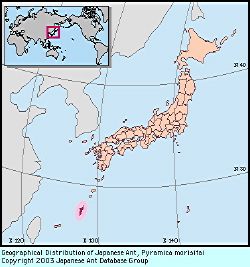
|
species
|
Pyramica morisitai
|
 |
Japanese Name
|
Kibaore-uroko-ari
|
Original Reference
|
|
Ogata, K. & Onoyama, K. (1998) A revision of the ant genus Smithistruma Brown of Japan, with descriptions of four new species (Hymenoptera: Formicidae). Entomological Science 1: 277-287.
|
Synonym
|
|
Smithistruma morisitai Ogata & Onoyama, 1998,
Pyramica morisitai (Ogata & Onoyama): Bolton, 1999,
|
Description
|
|
Total length of workers around 1 mm. Body color brownish yellow. Mandibles elongate, as long as clypeus; the anterior third of each shaft bent strongly downwards to form an obtuse but distinct angled corner when viewed laterally; the subapical portion slightly concave in lateral view, and forming a shallow space in frontal view, when the mandibles are closed. Antennae 6-segmented. Scapes broadened at the basal third, and not forming an angulate elbow; apical funicular segment elongate, as long as the scape or the remaining funicular segments together. Head twice as long as wide. Clypeus longer than broad; anterior margin narrowly convex. General shape of mesosoma similar to that of Pyramica incerta, but without angulate pronotal humeri; dorsal outline gently convex; posterior margin of propodeum with thin bilateral lamellate appendages and dorsal spiniform processes. Spongiform appendage present on petiole and postpetiole. Body hairs narrow, scale-like and appressed.
|
Remarks
|
|
A rare species, known only from 2 records of specimens taken under stones in a rather open situation. P. morisitai was assigned to an "unnamed genus" in "A List of the Ants of Japan with Common Japanese Names" (1988) and "A Guide for the Identification of Japanese Ants (III)" (1992) by Myrmecological Society of Japan Editorial Committee. This corresponds to the "unnamed new genus?" of Onoyama (1976). The peculiarly curved mandibles of this species resemble those of Asketogenys, a monotypic genus described by Brown (1972) from Malaysia. But the dentition, the shape of the clypeus and mesosoma and the pilosity are quite different.
|
|

Distribution
|
|
Okinawa I. (Azuma, Kunigami-gun [Takuya Abe leg.]; Nago [Hidetsune Takamine leg.])
|
|
References
|
|
- A revision of the ant genus Smithistruma Brown of Japan, with descriptions of four new species (Hymenoptera,Formicidae). Entomological Science 1: ***-***.
- Bolton, B. 1999. Ant genera of the tribe Dacetonini (Hymenoptera: Formicidae). J. Nat. Hist., 33: 1639-1689.
- Myrmecological Society of Japan, Editorial Committee (ed.) (Ed.). (1988). A list of the ants of Japan with common Japanese names. The Myrmecological Society of Japan, Tokyo.
- Myrmecological Society of Japan, Editorial Committee (ed.) (1992). A guide for the identification of Japanese ants (III). Myrmicinae and supplement to Leptanillinae (Hymenoptera: Formicidae). The Myrmecological Society of Japan, Tokyo.
- Onoyama, K. (1976). A preliminary study of the ant fauna of Okinawa-Ken, with taxonomic notes. (Japan: Hymenoptera: Formicidae). . Ecol. Stud. Nat. Cons. Ryukyu Isl., 2, 121-141.
- Brown, W. L., Jr., 1972
|
Editor
|
|
Original text by Kazuo Ogata and Keiichi Onoyama. English translation by Kazuo Ogata. Revised by Masashi Yoshimura.
|
|